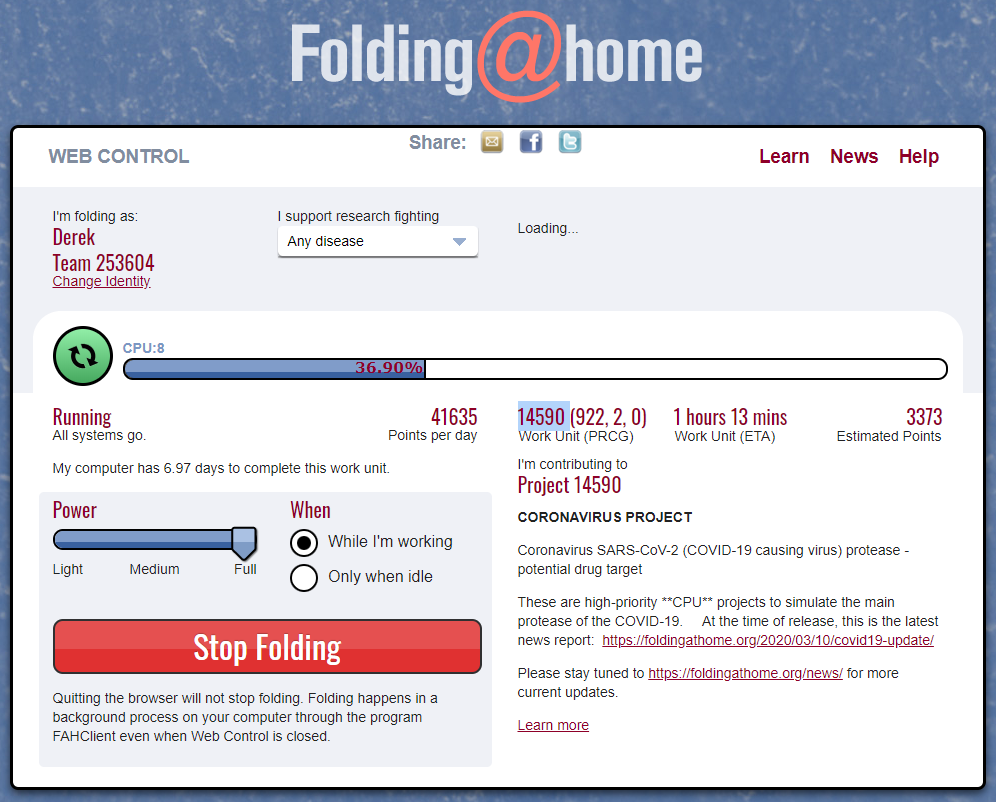With the downtime due to COVID-19, casinos and other properties have a unique opportunity, right now, to help find a cure; by utilizing the processing power of their data centers to get involved in something known as “folding@home.” Please see our article for a background on the project as well as important details for your IT department.
What is “Folding?”
The term folding refers to the way proteins are folded inside the cells of your body. Our bodies need proteins in order to stay healthy. As the proteins assemble, they “fold” themselves into shape; if they happen to misfold, the consequences could have serious outcomes on a person’s health.
Knowing how proteins fold, their structures and movements, help us better understand COVID-19 and allow us to target new therapies and drugs. We’ve learned that the first steps of a Coronavirus infection occur in the lungs when a protein on the surface of the virus, known as a “spike protein”, binds to a receptor protein on a lung cell. A therapeutic antibody is a type of protein that can block the virus binding to a lung cell, therefore preventing the lung cell from being infected. A therapeutic antibody such as this has already been developed for SARS-Cov, but due to the small size of 2019-nCoV, researchers and scientists need more information on how the spike protein binds to the lung cell. That’s where the dormant power of Casino data centers can help.
Why “at Home?”
Proteins are amazingly complex chains of amino acids which require tremendous amounts of computing power to decipher their sequences. Folding@Home is a distributed computing project meant for simulating protein dynamics. The project brings together people who volunteer their spare compute power to help run simulations. The volunteers set aside processing power and “projects” or “work units” get assigned to them. The user has access to a dashboard that shows the progress and project that they’ve been assigned; COVID-19 projects are currently top priority.

Is it secure?
Yes, if it is deployed correctly. The team that put Folding@home together have worked diligently to ensure that the program does not communicate with any systems other than the data distribution and collection servers at Stanford. Because of COVID-19, there is an increased interest and awareness in this project. Opportunistic evil-doers have taken note and crafted software that appears to contribute to the project but are instead filled with password-stealing malware.
We at Synergy take a zero-trust approach to security, which is why our recommendation is to avoid running the software on your existing virtual machines. Instead run it on net-new virtual appliances that are dedicated solely to the task of this project. We also recommend a new and isolated DMZ virtual network that is firewalled from accessing your enterprise networks and only allowed to access the required Internet resources for receiving raw data & transmitting the computed results. Taking this approach creates a secured enclave for your participating compute resources and will allow for an incremental decommissioning of your Folding@home nodes when regular Casino operations begin to spool back up.
Is it easy?
Reach out to us at Synergy and we can help you get started, or visit the following link and download the VMware OVA file and PDF instructions to get started on your own. If you would like to contribute your spare compute power on behalf of the Synergy Information Solutions Team, use team ID: 253604
https://flings.vmware.com/vmware-appliance-for-folding-home
Volunteer and Help Now!
“Folding at home” is not limited to just personal home computers; a casino property could use their massive and powerful data centers to help with simulations right now. We encourage all to check out Folding@Home and volunteer to help with COVID-19 research. If you are a casino property and would like to volunteer, Synergy Information Solutions will donate our professional services to get you up and running securely.





